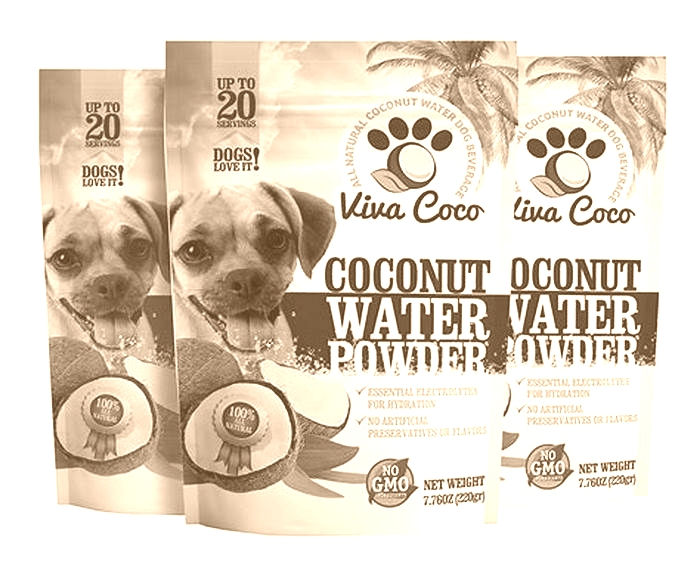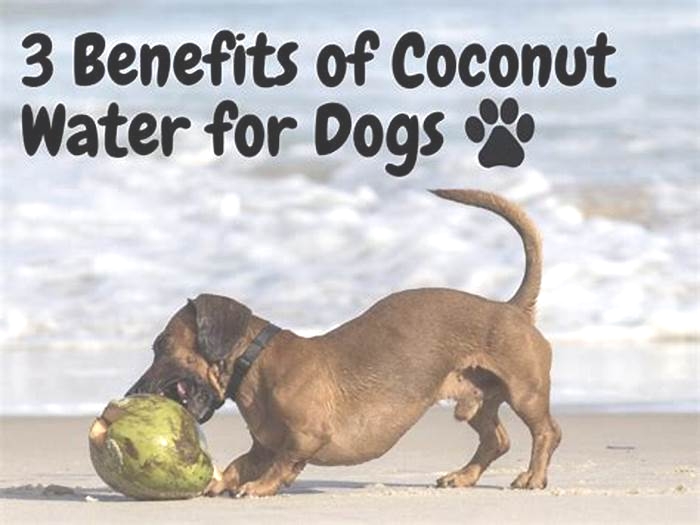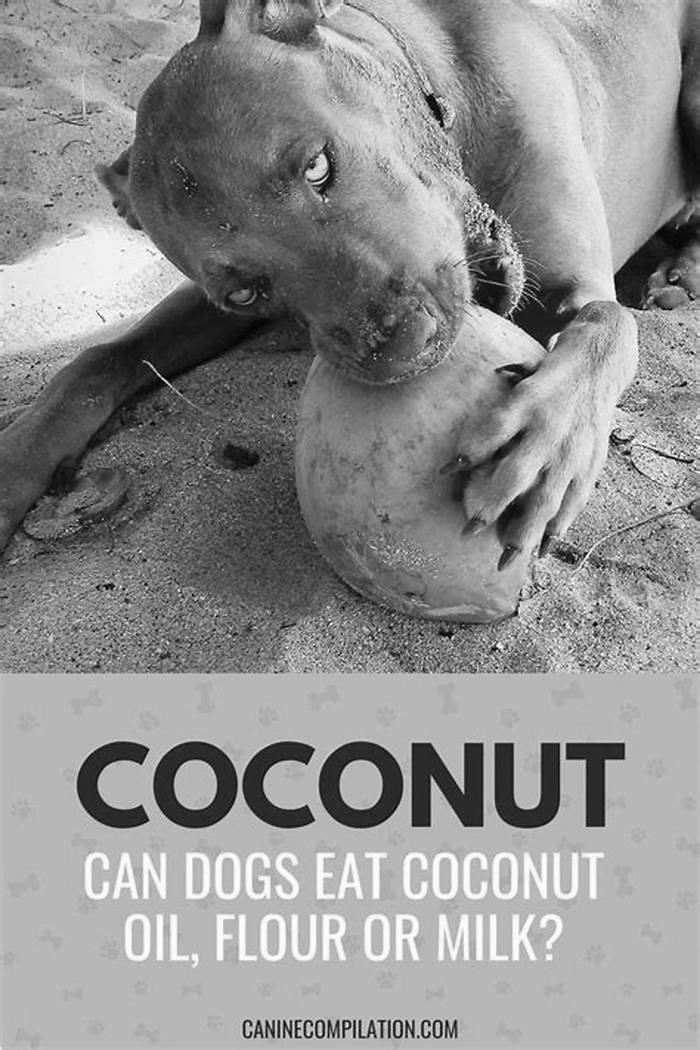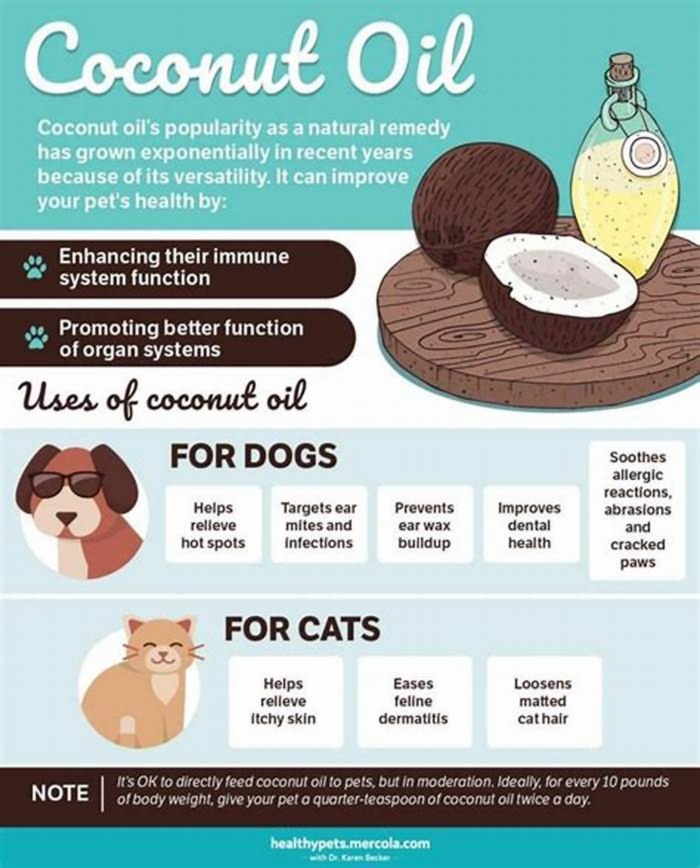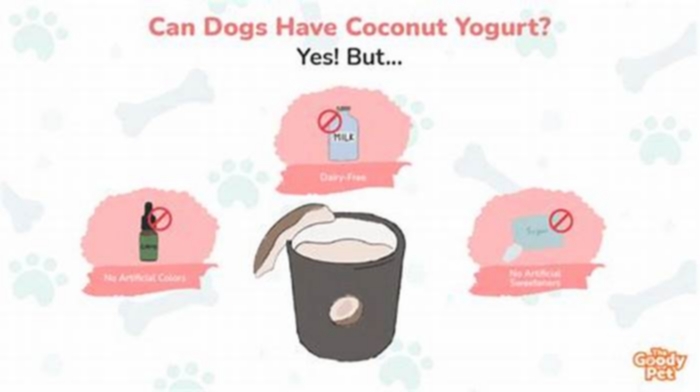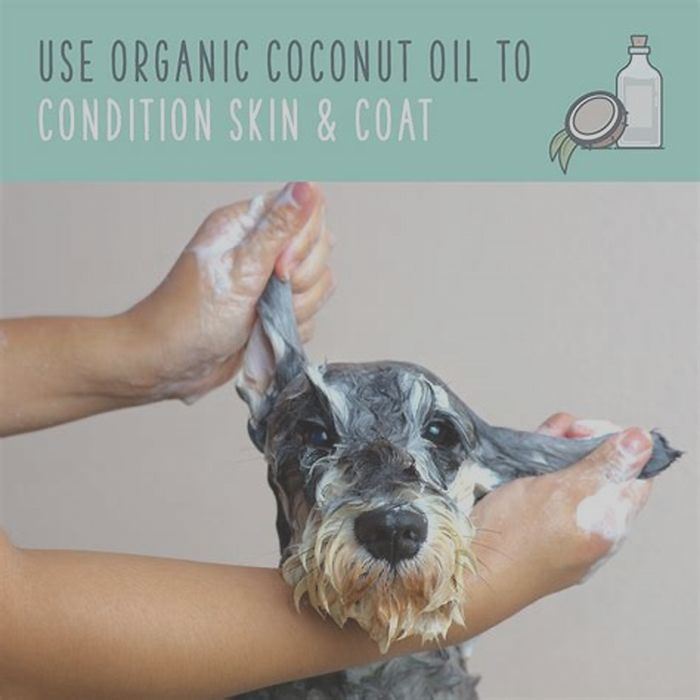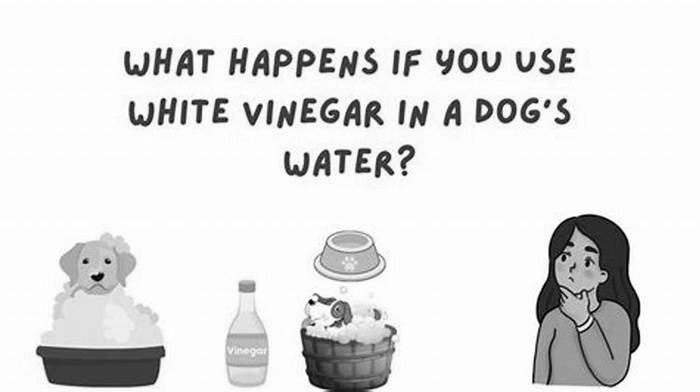Can dogs have coconut water

Can Dogs Drink Coconut Water? Everything You Need To Know

Coconut water is sweet, tasty, and replenishes electrolytes, so you may wonder, can dogs drink coconut water? When it comes to human health trends, we often assume that whats good for us is also good for our dogs. So always better to investigate first.
Coconut water should not be confused with milk or oil, which are two different coconut products. The water specifically may benefit dogs with UTIs and kidney stones, but like any human food, we always need to be careful about feeding our dogs anything in excess.
Coconut water can be good for your dogs digestion, especially with supplements like a quality probiotic chew. Here, we cover what makes it good for dogs and any health risks it may have.
So, Can Dogs Drink Coconut Water?
Coconut water is safe and even beneficial for dogs in small quantities. When dogs are exercising intensively, a few teaspoons of coconut water can help them rehydrate. But the high potassium levels can be dangerous to dogs in excess.
So if youre wondering, can dogs drink coconut water everyday?. The answer is no. If dogs have a balanced diet with the right amount of minerals, giving something that can create an excess is dangerous.
However, coconut water is a natural drink and is fine as an occasional treat for your dog. However, while it offers hydration, electrolytes, and other benefits, coconut water can never substitute good old plain water.
Before introducing coconut water into your dogs diet, introduce the beverage gradually. This establishes if your dog can have the drink without creating problems like tummy issues.
What is Coconut Water?
Coconut water is the clear liquid inside the center of green coconuts. It is not the same as milk, which is made with water and coconut meat, and it is not the same as oil, which is the fat or lipids extracted from the coconut.
What Kind of Coconut Water Can Dogs Have?
Dogs can have a small amount of 100% purely natural, additive-free coconut water to enjoy maximum health benefits. However, look for artificial additives in some store-bought products like xylitol, a common sweetener that is toxic to dogs.
Sweetened, xylitol-free coconut water isnt good either because the added sugar can cause health issues like diabetes and obesity. Sticking to the basics and giving your dog the clear liquid directly from fresh coconut is best, although you can still purchase it from the store.
Health Benefits of Coconut Water for Dogs

Coconut water can benefit your pooch due to its anti-inflammatory properties, nutrients, and electrolyte content. Whether you freeze the drink into dog treats or give it to your dog directly, its an asset to your canines health.
1. High in Vitamins and Minerals
This drink has several biologically active components like amino acids, vitamins, and minerals that include:
- Vitamin C Boosts a dogs vitality and is a powerful antioxidant
- B-vitamins These water-soluble vitamins are necessary as coenzymes for enzymatic reactions vital for cellular function
- Potassium Helps in electrical charges of the heart and muscles. Coconut water may be good for dogs with hypokalemia, which is a potassium deficiency. However, a high potassium content can get excessive in dogs (hyperkalemia) if given too much coconut water. If your dog is already ingesting a lot of potassium in their dog food with ingredients like sweet potatoes and liver, be careful. Too much potassium can affect their hearts.
Remember that the ASPCA lists coconut and its products as dangerous to dogs due to high potassium levels.
- Calcium Important for bone health in the right amounts
- Iron Essential for carrying oxygen in the blood
- Zinc Helps a dogs immune system, coat health, and thyroid function
The next time youre from intense exercise with your dog, sneaking them a sip of your coconut water can help them rehydrate. The drink contains five electrolytes a dog needs: potassium, magnesium, phosphorus, sodium, and calcium. But remember, no more than a sip.
While coconut water can make a great isotonic drink, nothing can top normal water for hydration. Because of the small amounts of coconut water recommended, your dog will still likely feel thirsty after drinking it.
2. Anti-Inflammatory Properties Aiding in Eliminating Free Radicals
When dogs exercise, the exercise increases the amount of oxygen they burn, causing oxidative damage (or free radicals), which can damage cells. The micronutrients found in coconut water give it anti-inflammatory properties, supporting your dogs immune system and protecting them from damage.
Eliminating free radicals reduces the chances of arthritis, cancer, and cardiovascular diseases.
3. Improves Digestion
Dogs are famed for their strong stomachs that can handle almost anything, but some dogs do have sensitive stomachs. Dogs can have small amounts cilantro, coconut water, and a dollop of plain yogurt to aid their sensitive stomach as a temporary solution.
This beverage contains monolaurin, a monoglyceride that soothes and cleanses the digestive tract. Additionally, this water is high in manganese which activates enzymes used in metabolism and regulates bowel movements.
4. It May Help Reduce Kidney Stones and UTIs
Kidney stones and urinary tract infections (UTIs) can result in dogs with a low thirst drive or who dont drink enough water. These dogs can benefit from adding a bit of flavor to their drink, which can be achieved with coconut water. More dog-specific studies on the UTI function of coconut water are necessary, but research on humans seems promising.
As a natural diuretic, coconut water can flush out toxins by promoting diuresis (increasing how often a dog needs to pee) and reducing UTIs. High potassium levels in the drink can play a key role in dissolving some kidney stones, reducing their size.
Remember that dogs get different kinds of kidney stones; some need to be removed surgically, and what works to dissolve one kind can cause another. So its vital to have a veterinarian assess any stones in the urinary tract.
Health Concerns of Coconut Water
Unfortunately, dogs should never have too much coconut water. Dogs that frequently take plenty of coconut water are at risk of gastrointestinal issues and hyperkalemia, among other problems. Lets look at some of the risks coconut water may pose to dogs.
1. Gastrointestinal Upset
This is the most common side effect of coconut water in dogs. Dogs with an upset stomach exhibit the following:
- Vomiting;
- Diarrhea;
- Lack of appetite;
- Discomfort; and
- Pacing.
2. Hyperkalemia
Dogs that take too much coconut water can suffer from hyperkalemia due to excessive potassium levels. This is a severe condition thats thankfully rare but requires medical attention. Signs include:
- Vomiting;
- Lethargy;
- Weight loss;
- Dehydration;
- Muscle loss;
- Breathing problems; and
- Paralysis.
3. Obesity
Coconut water has a high-calorie content of about 60 kcal per cup. Coconut water must be kept within your poochs daily caloric allowance to stay within a healthy weight. Excessive coconut water can cause weight gain, then obesity.
Obesity poses major health risks to dogs, including diabetes, high blood pressure, cancer, and heart disease.
How to Give Your Dog Coconut Water: How Much Coconut Water is Okay for Dogs?
The exact amount of coconut water to give your dog isnt a one-size-fits-all, and it varies based on your dogs size. A few ounces every few days a week will suffice. Its essential to introduce the drink gradually in tablespoon amounts to determine if your dog reacts to it.
Some dogs with sensitive stomachs may react negatively to coconut water with an upset stomach. Others are allergic to the drink, although allergies are quite rare.
You Can Serve Your Dog Coconut Water This Way:
- Mix a couple of ounces into their drinking water;
- Give it to your dog directly as a treat; or
- Freeze and give to your dog as a frozen treat.
Can Dogs Have Coconut Milk?
Dogs should not have coconut milk as a regular part of their diet. Remember that coconut products are listed as dangerous to dogs because of the high levels of potassium.
Coconut milk is higher in fat and is a mixture of shredded coconut flesh and water. The greater fat content makes coconut milk risky to your dogs weight when given in large quantities over long periods.
Excessive consumption leads to stomach upset with diarrhea and vomiting.
Can Dogs Drink Coconut Oil Everyday?
Coconut oil is high in fat and shouldnt be taken by dogs every day. Excessive coconut oil will cause stomach upset in dogs and obesity after extended use. A teaspoon for small dogs and a teaspoon for big dogs should be enough for dogs that dont react to coconut oil.
Frequently Asked Questions (FAQS)
Is coconut water good for a dogs skin?
Coconut water may be good for dogs skin and coat. The drink is high in B vitamins that promote coat health and eliminate free radicals that would damage the coat. It also has antibacterial and antifungal properties that support skin health.
Is coconut water good for dogs with UTIs?
Coconut water helps dogs with UTIs by increasing urine production, which flushes out toxins. Additionally, the potassium content in the drink helps dissolve some kidney stones, effectively reducing their size. The drink also encourages dogs with UTIs to drink more water.
Is coconut water good for dogs with parvo?
Parvo causes sick dogs to lose water excessively due to diarrhea and vomiting, which can lead to severe dehydration and death. Dogs recovering from parvo can benefit from coconut water as it replenishes electrolytes in the body, reducing dehydration. But your dog will still need immediate medical treatment.
Is coconut water good for a dogs diarrhea?
Coconut water helps a dog with diarrhea by introducing electrolytes that are lost. If the diarrhea results from indigestion, coconut water reduces it because the drink aids digestion. Other digestive issues like constipation can improve with coconut water and other home remedies aiding dog scooting.
Can coconut water give a dog diarrhea?
Coconut water can cause diarrhea if dogs drink it in large quantities. Gastrointestinal issues are easy to spot and cause vomiting, diarrhea, and reduced appetite. Dogs with sensitive stomachs can have diarrhea even with little coconut water.
Final Thoughts
Dogs can safely drink coconut water and enjoy benefits like rehydration, better digestion, and nutrition. Coconut consumption should be controlled in dogs to prevent gastrointestinal issues and obesity due to its high fat content. Coconut oil and milk are other coconut by-products that benefit dogs in small quantities.
Meet Your Experts
Tamsin De La Harpe
Author
Tamsin de la Harpe has nearly two decades of experience with dogs in rescue, training, and behavior modification with fearful and aggressive dogs. She has worked closely with veterinarians and various kennels, building up extensive medical knowledge and an understanding of canine health and physiology. She also spent two years in the animal sciences as a canine nutrition researcher, focusing on longevity and holistic healthcare for our four-legged companions.Tamsin currently keeps a busy homestead with an assortment of rescue dogs and three Bullmastiffs.
Tamsin de la Harpe has nearly two decades of experience with dogs in rescue, training, and behavior modification with fearful and aggressive dogs. She has worked closely with veterinarians and various kennels, building up extensive medical knowledge and an understanding of canine health and physiology. She also spent two years in the animal sciences as a canine nutrition researcher, focusing on longevity and holistic healthcare for our four-legged companions.Tamsin currently keeps a busy homestead with an assortment of rescue dogs and three Bullmastiffs.
Can Dogs Drink Coconut Water? All You Need To Know
Can dogs drink coconut water? To know it read the full article. The answer is yes. They can drink coconut water.
Many pet owners may wonder if its safe for their dogs to consume coconut water. This report explores the potential benefits and risks associated with dogs drinking coconut water.
Can dogs drink coconut water?
Here are 20 potential benefits of coconut water for dogs:
1.Hydration: Coconut water is a natural source of hydration, helping to replenish fluids in dogs.
2. Electrolyte Balance: The electrolytes in coconut water, such as potassium and magnesium, support proper nerve and muscle function. Coconut water contains electrolytes, which can be beneficial for hydration. However, if your dog is on specific medications or has special dietary requirements related to their epilepsy, your veterinarian can guide you on how coconut water might fit into their overall management plan.
3.Low in Calories: Coconut water is a low-calorie beverage, making it a suitable option for dogs on calorie-restricted diets.
4. Vitamins and Minerals: It contains essential vitamins and minerals, contributing to overall canine health.
5.Improved Digestion: Some dogs may find relief from digestive issues due to the hydrating and soothing properties of coconut water.
6. Boosted Immunity: Antioxidants in coconut water may contribute to a strengthened immune system in dogs.
7.Joint Health: The anti-inflammatory properties of coconut water may assist in maintaining joint health.
8.Promotes Healthy Skin and Coat: The nutrients in coconut water can contribute to a shiny coat and healthy skin in dogs.
9.Improved Kidney Function: Adequate hydration supports kidney function, and the electrolyte balance in coconut water may be beneficial for dogs with kidney issues.
10.Natural Detoxification: The hydrating properties of coconut water can aid in flushing out toxins from a dogs system.
11. Supports Weight Management: Being low in calories, coconut water can be a part of a weight-conscious diet for dogs.
12.Balances Blood Sugar Levels: Coconut water may help regulate blood sugar levels due to its low glycemic index.
13.Reduces the Risk of Urinary Tract Infections: Adequate hydration can contribute to a lower risk of urinary tract infections.
14.Aids in Recovery After Exercise: The electrolytes in coconut water can assist in replenishing lost fluids after physical activity.
15.Anti-Inflammatory Effects: The anti-inflammatory properties of coconut water may benefit dogs with inflammatory conditions.
16.Improved Liver Function: Some components of coconut water may support liver health in dogs.
17.Reduces Bad Breath: Improved hydration can contribute to better oral health, potentially reducing bad breath.
18.Alleviates Constipation: Coconut waters hydrating properties may help ease constipation in dogs.
19.Natural Source of Energy: The natural sugars in coconut water can provide a quick energy boost for active dogs.
20.May Help with Allergies: Some dogs with allergies to other liquids may tolerate coconut water well, providing an alternative hydration source.
potential disadvantages and risks

While coconut water can offer some benefits to dogs, its essential to be aware of potential disadvantages and risks. Here are some considerations:
1.High Potassium Content: While potassium is essential, excessive intake can be harmful, especially for dogs with kidney issues. Too much potassium may lead to hyperkalemia.
2.Caloric Content: Despite being low in calories, excessive consumption can contribute to weight gain, especially for dogs on calorie-restricted diets.
3.Digestive Upset: Introducing coconut water too quickly or in large quantities may cause digestive upset, leading to diarrhea or vomiting in some dogs.
4.Allergic Reactions: Some dogs may be allergic to coconut or may develop sensitivities, resulting in allergic reactions such as itching, redness, or swelling.
5.Laxative Effect: Coconut waters natural laxative properties could lead to increased bowel movements, potentially causing diarrhea in sensitive dogs.
6.Interference with Medications: The potassium content in coconut water may interact with certain medications, affecting their efficacy. Consult with a veterinarian if your dog is on medication.
7.Risk of Pancreatitis: Coconut water contains natural sugars, and excessive consumption may pose a risk for dogs prone to pancreatitis or those with diabetes.
8.Possible Gastrointestinal Distress: Some dogs may not tolerate the taste or composition of coconut water, leading to refusal or aversion.
9.Dental Health Concerns: Coconut water, like any sweetened liquid, may contribute to dental issues if not part of a well-balanced oral care routine.
10.Impact on Blood Sugar Levels: While coconut water has a low glycemic index, dogs with diabetes or insulin sensitivity may require careful monitoring if coconut water is introduced into their diet.
11.Concerns for Dogs with Heart Issues: High potassium levels in coconut water may be problematic for dogs with heart conditions, as it can impact heart function.
12.Sodium Imbalance: While coconut water is generally low in sodium, excessive consumption could potentially contribute to sodium imbalances in certain situations.
13.Environmental Impact: The production and transportation of coconuts and coconut water have environmental considerations, such as carbon footprint and sustainability.
14.Quality and Additives: Commercial coconut water products may contain additives or preservatives that could be harmful to dogs. Always choose natural, additive-free options.
15.Individual Variability: Dogs, like humans, have individual tolerances and preferences. What works for one dog may not be suitable for another.
16.Overconsumption Risk: Some dogs may be enthusiastic drinkers and might overconsume, leading to potential health issues.
majority of dogs appear to enjoy drinking coconut water, and it can serve as a palatable and hydrating option for many. Pet owners interested in introducing coconut water to their dogs diet are encouraged to do so gradually, observe their dogs response, and consult with a veterinarian to ensure it aligns with their pets specific health needs. The positive reception observed in this survey suggests that coconut water can be a welcomed addition to the repertoire of canine hydration options for many pet owners.
What time of the day is the best to give my dog coconut water
The timing of when to give your puppy coconut water can depend on various factors, including your puppys individual needs, activity levels, and overall health. Here are some considerations to help you decide when might be the best time to give your puppy coconut water:
1.After Physical Activity:
Offering coconut water after your puppy has engaged in physical activity, such as playtime or exercise, can be beneficial. This is a time when your puppy may need extra hydration to replenish fluids lost during exertion.
2.During Warm Weather:
Hot weather can increase the risk of dehydration, so offering coconut water during warmer times of the day can help keep your puppy well-hydrated.
3.As a Refreshing Treat:
Some puppies enjoy coconut water as a refreshing treat. You can offer it during times when your puppy might appreciate a tasty and hydrating reward.
4.In the Morning or Evening:
You can offer coconut water in the morning or evening as part of your puppys routine. Some puppies may prefer it at a specific time of day, and consistency can help establish a positive association.
5.Post-Grooming or Baths:
If your puppy is stressed or needs to cool down after grooming or a bath, offering coconut water can be a calming and hydrating option.
6.Before Bedtime:
While not a common practice, some puppies may enjoy a small amount of coconut water before bedtime. However, be mindful of the potential for increased bathroom breaks during the night.
7.When Introducing New Foods:
If youre introducing coconut water for the first time, consider offering it at a time when your puppy is calm and relaxed. This helps create a positive association with the new beverage.
8.Monitor Your Puppys Response:
Pay attention to how your puppy responds to coconut water at different times of the day. If your puppy shows a preference or dislikes it at certain times, adjust your offering accordingly.
Always consider your puppys age, health status, and individual preferences. If you have any concerns or if your puppy has specific health conditions, its advisable to consult with your veterinarian before introducing new foods or beverages, including coconut water, into your puppys diet.
What are the likely allergic reactions of coconut water for dogs?
While coconut water is generally considered safe for most dogs, there is still a possibility of allergic reactions, albeit rare. Allergies can vary from one dog to another, and the severity of reactions can range from mild to severe. Here are some potential allergic reactions to coconut water in dogs:
1.Itching and Redness: Allergic dogs may exhibit signs of itching, redness, or irritation on the skin. This can occur around the mouth, face, or other parts of the body.
2.Swelling: Swelling of the face, lips, or tongue is a more severe allergic reaction and requires immediate veterinary attention.
3. Digestive Upset: Some dogs may experience digestive issues, such as diarrhea or vomiting, as a response to allergens in coconut water.
4.Hives: Raised, red welts or hives on the skin may indicate an allergic reaction. This can be accompanied by itching and discomfort.
5.Difficulty Breathing: In severe cases, an allergic reaction can lead to difficulty breathing. This is an emergency situation, and immediate veterinary intervention is crucial.
6. Watery Eyes or Runny Nose: Allergic dogs may exhibit symptoms similar to hay fever in humans, including watery eyes and a runny nose.
Its important to note that these allergic reactions are relatively uncommon, and many dogs can enjoy coconut water without any adverse effects. If you are introducing coconut water to your dog for the first time, observe their behavior and monitor for any signs of discomfort or allergic reactions.
If you suspect that your dog is having an allergic reaction to coconut water or any other substance, seek veterinary attention promptly. Your veterinarian can provide guidance, conduct allergy testing if necessary, and recommend appropriate treatments to manage allergic symptoms.
Before introducing new foods or beverages into your dogs diet, especially if your dog has a history of allergies or sensitivities, its advisable to consult with your veterinarian for personalized advice.
How Much Coconut Water Can I Give My Dog?
The amount of coconut water you can give to your dog or can dogs drink coconut water everyday? It depends on various factors, including your dogs size, age, health condition, and overall dietary needs. While coconut water can offer hydration and some nutritional benefits, moderation is key. Here are some general guidelines:
1.Start Small:
Introduce coconut water gradually, starting with small amounts. This allows you to monitor your dogs reaction and ensure they tolerate it well.
2. Consider Your Dogs Size:
Larger dogs can generally tolerate more coconut water than smaller dogs. Adjust the serving size based on your dogs size and weight.
3. Observe Your Dogs Reaction:
Pay attention to how your dog responds to coconut water. Some dogs may enjoy it and show no adverse effects, while others may not be as receptive.
4. Use Coconut vita Water as a Supplement:
Coconut water should be viewed as a supplement rather than a primary source of hydration. Fresh, clean water should always be available to your dog.
5.Limit Sugary or Flavored Varieties:
If you are using commercially available coconut water, choose natural and unsweetened varieties. Flavored or sweetened options may contain additives that are not suitable for dogs.
6.Consult with Your Veterinarian:
If you have concerns about the appropriate amount of coconut water for your dog, or if your dog has specific health conditions, consult with your veterinarian. They can provide personalized advice based on your dogs individual needs.
7.Consider Overall Diet:
Take into account your dogs overall diet and nutritional needs. Coconut water should complement a balanced and complete diet rather than replace essential nutrients from regular dog food.
8. Monitor Hydration Needs:
Adjust the amount of coconut water based on your dogs hydration needs. For example, during hot weather or after vigorous exercise, your dog may benefit from increased hydration.
9.Watch for Allergic Reactions:
Be vigilant for any signs of allergies or adverse reactions. If you notice itching, swelling, digestive upset, or any other concerning symptoms, discontinue the coconut water and consult your veterinarian.
As a general guideline, a few tablespoons to a quarter cup of coconut water a couple of times a week may be suitable for many dogs. However, individual dogs may respond differently, so its essential to tailor the amount to your specific dogs needs and monitor their
Can epilectic dogs drink coconut water
While coconut water is generally considered safe for most dogs, including those with epilepsy, its essential to approach dietary changes cautiously, especially for dogs with pre-existing medical conditions. If you have an epileptic dog and are considering introducing vita coconut water into their diet, its advisable to consult with your veterinarian before doing so. Here are a few points to consider:
Coconut water with pineapple
coconut water with pineapple can be safe for most dogs in moderation, as long as the ingredients are safe for canine consumption. However, there are a few important considerations:
Natural and Unsweetened:
Choose vita coconut water with pineapple that is natural and unsweetened. Avoid products with added sugars, sweeteners, or artificial additives, as these can be harmful to dogs.
Pineapple Allergies:
Before introducing coconut water with pineapple, consider whether your dog has any known allergies to either coconut or pineapple. Allergic reactions can vary from dog to dog, so monitor for any signs of allergies, such as itching, swelling, or digestive upset.
Moderation is Key:
While coconut water and pineapple can offer some nutritional benefits, its important to offer them in moderation. Too much fruit, including pineapple, can lead to digestive upset due to the natural sugars and fiber content.
Introduce Gradually:
If youre introducing coconut water with pineapple for the first time, start with small amounts and monitor your dogs reaction. Some dogs may have sensitive stomachs, and a gradual introduction helps minimize the risk of digestive issues.
Monitor for Digestive Upset:
Keep an eye on your dog for any signs of digestive upset, such as diarrhea or vomiting. If you notice any adverse reactions, discontinue the coconut water with pineapple and consult with your veterinarian.
Avoid Artificial Additives:
Steer clear of coconut water with pineapple that contains artificial flavors, colors, or preservatives. These can be harmful to dogs, and its best to offer natural and unprocessed options.
Consider Your Dogs Overall
Take into account your dogs overall diet and nutritional needs. Coconut water with pineapple should complement a balanced and complete diet rather than replace essential nutrients from regular dog food.
Always remember that individual dogs can have different tolerances and preferences. What works well for one dog may not be suitable for another. If you have any concerns or questions about incorporating coconut water with pineapple into your dogs diet, If your dog is diagnosed with kidney failure (also known as renal failure or chronic kidney disease), its crucial to carefully manage their diet and fluid intake. While coconut water is generally considered safe for dogs, including those with kidney issues, its use should be approached cautiously and under the guidance of a veterinarian.
Related Posts:
Read More: Why Does My Dog Open His Mouth When I Pet Him? 7 Reasons
Read More: Why Does My Dog Keep Sniffing My Legs: 5 Common Reasons
Read More: Why Does My Dog Bite Me In The Morning? 2 Way To safe From
Read More: Why Are My Dogs Balls Black? Best Number 1 Answer
Read More: Why Do Dogs Like Peanut Butter?
Read More: Why Does My Dog Nibble My Ear? 10 Reasons
Read More: Why Does My Dog Move Its Bed Around?
Read More: Why Does My Dog Bring Me His Food?
Read More: Why Does My Dog Lay His Head Over My Neck? 7 Reasons
Read More: Why Does My Dog Sit On My Chest When I Lay Down?

